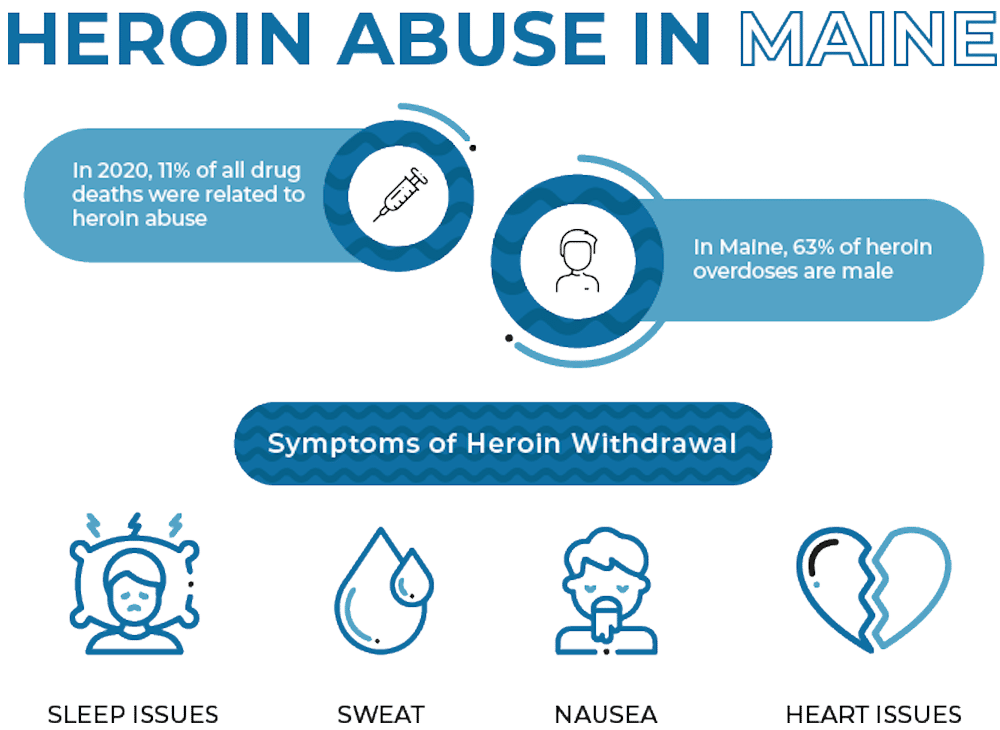
If one is addicted to a substance, it is critical to seek out a substance abuse treatment program. Without treatment at a quality heroin rehab center, your addiction may worsen. Substance abuse can lead to a higher risk of a life-threatening overdose. To combat heroin use in the Portland, Maine area and beyond, Casco Bay Recovery offers a heroin rehab program. In our rehab facility, clients find support, resources, and the therapies that they need to heal.
What is Heroin?
Heroin is a powerful opioid drug that is typically injected into the veins. It attaches to specific sites in the brain known as opioid receptors, which are activated by chemicals called heroin metabolites. The heroin causes a surge in dopamine levels and a feeling of pleasure or euphoria for users.
When heroin enters the body it breaks down into morphine. Heroin is often seen as having the same effects as prescription opiate painkillers like Vicodin, Percocet, Lortab, and even oxycodone.
Common street names for heroin include:
- Big H
- Black Tar
- Chiva
- Hell Dust
- Horse
- Negra
- Smack
- Thunder
Are There Different Forms of Heroin?
Although purer heroin is becoming more common, most street heroin is “cut” with other drugs or with substances such as sugar, starch, powdered milk, or quinine.
What are Heroin’s Risks?
Beyond becoming addicted to heroin, there are other serious short-term and long-term risks associated with heroin use. Short-term heroin use can lead to slowed breathing, nausea, vomiting, sleepiness, itching, and/or loss of consciousness.
Long-term heroin use can lead to collapsed veins, infection of the heart lining and valves, abscesses (pus pockets) in the liver or lungs, liver disease, kidney disease, lung complications, bloodborne infections such as hepatitis B and C and HIV (“AIDS”), and a general decline in health resulting from abuse.
Heroin Addiction in Maine
Heroin addiction has impacted Maine’s population and getting help at a professional treatment center like Casco Bay can help. Maine has been extremely affected by addiction over the past few years. In fact, studies have found that heroin use has increased amongst young adults in Maine for the last two decades.
In 2020, 504 Mainers died from drug overdoses. This is an increase of 33 percent compared to the 380 drug overdose deaths in 2019, according to reports. Heroin caused 57 deaths (11% of all drug deaths and 18% of opioid deaths), slightly fewer in number and proportion of all drug deaths. There was also about the same proportion of opioid deaths in Maine as in 2019 (61, 16% of all drug deaths and 19% of opioid deaths.)
Reasons for Heroin Epidemic in Maine
This heroin epidemic stems from many different factors such as lack of economic opportunity and education within rural communities, along with high unemployment rates and poverty. Heroin users often believe that heroin is more socially acceptable than other drugs. This is because of its widespread use throughout their communities.
The heroin abuse numbers found in Maine are not only caused by these economic difficulties. However, drug trafficking routes that run through major North American cities such as New York City and Portland, Maine have contributed as well.
This heroin epidemic has become a major public health issue in the state of Maine. This is because heroin opioid and heroin overdoses were 64% and 63% male, respectively. Slightly more than half of all overdose patients are male, but males make up a disproportionate share of overdoses involving opioids, especially heroin.
In order to assist heroin addicts, rehab centers have developed special programs for heroin addicts to rehabilitate themselves back into society. It’s important for heroin addicts entering rehabilitation programs to be aware that they will only succeed if they remain motivated and committed to their recovery process. In order to provide knowledge about addiction treatment centers, we’ve compiled a list of tips from our own counselors on what to expect.
The Signs and Symptoms of Heroin Abuse
The signs and symptoms of heroin use include some pretty obvious things. Heroin can be injected into the veins, smoked in a pipe, or mixed with water and then injected. Those who smoke heroin often use heroin that is laced with fentanyl or Dilaudid, which gives a stronger high and increases the risk of an overdose.
The heroin intravenously hits the brain within seconds of being injected. When it is smoked, heroin enters the bloodstream slower to reach the brain slower.
When heroin is snorted it takes 7-10 minutes before heroin enters the bloodstream. So people will often inject heroin after they have snorted it to get an instantaneous effect.
Symptoms of withdrawal include being unable to sleep well and feeling restless and irritable. The need for heroin seems to feel so much more important than any other need – including being hungry or even going to the bathroom. Thus, heroin addicts will not eat as much as they should and could easily waste away from not getting the nourishment that their bodies need.
Some heroin addicts may appear to be fine for a period of time but eventually, withdrawal symptoms will become evident. Heroin is an incredibly addictive drug, so heroin addicts can never stop using heroin unless they go through professional addiction treatment.
How is Heroin Addiction Diagnosed?
Signs of heroin use are:
- Constantly needing more heroin for pain relief
- Sleeping difficulties
- Mental health problems such as depression or anxiety, heroin cravings
- Withdrawal symptoms (which can be severe if heroin use is stopped suddenly)
- Poor performance at work or school
- Committing illegal acts in order to get heroin, such as stealing from family members or friends or selling personal belongings
If heroin use continues, tolerance for heroin will increase and the person will need more heroin to achieve the same results. This means that over time heroin addicts have to use more heroin just to feel normal, often leading people who were initially casual users to become full-blown heroin addicts. People with addictions to heroin may also neglect their responsibilities like doing housework or taking care of children in order to spend more time getting heroin.
People with an addiction may start to experience symptoms of withdrawal if they don’t take their usual dose of heroin. People who are heroin-addicted may not appear like they are experiencing the negative effects of withdrawal immediately after stopping heroin use though. These symptoms usually appear within 8 hours after the last administration of heroin and resolve within 5-7 days after.
Why Heroin Treatment Is So Important
If you’re facing heroin addiction and dependence, your body may be so reliant on the drug that you cannot stop using it without feeling intense pain, withdrawals, and cravings. Even though you want to stop, it may not seem like you can’t through willpower alone. That is due to the changes in the brain’s chemistry that happen when using heroin. Even over a short time, your brain becomes dependent on the drug to function.
As a result, many people that suffer from heroin addiction experience common withdrawal symptoms such as these when they try to stop using:
- Intense headaches, muscle pain, and bone pain
- Nausea and vomiting
- Fevers, chills, shaking, and a runny nose
- Agitation and anxiety, often paranoia
- Trouble concentrating
- Intense cravings
If you suffer from heroin dependence or addiction, now is the best time to get help at an addiction treatment center. The longer you wait to get help, the more likely it is for tolerance to grow. That means you may need to use more heroin to get the same results and relief. As you increase your dose, the risk of overdose is heightened. Heroin overdose can lead to death.
Addiction rehab teaches you everything there is to know about heroin and how it affects your body and mind. You will also learn various ways to stop using this drug for good (which can either involve quitting “cold turkey” or using withdrawal drugs such as methadone.) Substance abuse can be a very problematic situation for everyone involved but having a set plan for relapse prevention, substance abuse resources, mental health services, and addiction recovery.
Heroin Detox and the Medications used to Treat Withdrawal

The medications used to treat heroin withdrawal are typically detox medications. Medications for withdrawal can be significantly helpful in heroin detox because they alleviate the symptoms that are associated with quitting heroin use.
Heroin addiction rehab is an integral part of treatment, which aims at teaching addicts how to live without heroin. This process can vary immensely depending on the individual, although it will generally involve heroin addiction education and psychotherapy (psychological treatment.). Therapy is also used during medical detox treatment programs. Detox not only helps a person overcome heroin addiction but also sets up the person for more personalized treatment such as outpatient treatment and inpatient treatment.
The most common short-term combination detox medications used during heroin detoxification include:
- clonidine ( Catapres )
- lofexidine ( Lucemyra )
- Methadone
- Benzodiazepines like lorazepam (Ativan), diazepam (Valium chlordiazepoxide)
Heroin addiction treatment can vary greatly depending on the individual. This is why heroin rehab centers have drug abuse programs that are customized to suit the needs of each heroin addict.
Heroin addicts who have quit heroin use should regularly attend rehab programs to maintain heroin abstinence once they leave addiction treatment.
Common medications used during heroin detoxification include:
- Buprenorphine (Suboxone) – to prevent relapse after detox
- Methadone – provides a longer-lasting opioid blockade than buprenorphine or naltrexone does. It was shown effective as a maintenance treatment for opioid dependence.
Receive Heroin Addiction Treatment at Casco Bay Recovery

There are medications available that can help to stop the withdrawal symptoms and create a safe way for your body to detoxify from the presence of drugs. This, in turn, helps your brain to heal, breaking the dependence on the drug. Thus, you don’t feel the cravings for drugs any longer.
Our team also helps you rebuild your life after addiction. To do that, you’ll engage in a range of therapy options. That includes working in both individual and group therapy to learn strategies for coping with addiction.
Many times, it also includes trauma treatment or managing mental health disorders that may have put you on the path to using heroin. Our team listens to you and creates an individualized treatment plan that fills your needs, creating true opportunities for healing.
Learn More About the Benefits of Our Heroin Rehab Center
Escaping heroin addiction can be challenging. When you call Casco Bay Recovery, you’ll find the professional support you need. One of our programs is outpatient, which means you can live at home and receive care. Furthermore, our Casco Bay rehab programs are designed to manage everything you are facing in a positive and compassionate light. We know how hard this path is but with the right tools, you can navigate it successfully. Some of our services and therapies include:
- 12-step program
- Dual diagnosis treatment
- Partial hospitalization program
- Intensive outpatient program
- Outpatient treatment program
- Day treatment program
Recognize the Opportunities at Casco Bay Recovery
Don’t become a statistic of the opioid epidemic. Instead, take a stand today to get help for your heroin addiction. Our heroin rehab center at Casco Bay Recovery is uniquely designed to empower your best healing and recovery journey.
Our drug and alcohol addiction programs are created for heroin treatment among other treatment options. Our compassionate team is here to help you today. Call us or connect with us now online for the support you need.
References:
https://nida.nih.gov/publications/research-reports/heroin/overview
https://www.dea.gov/sites/default/files/2020-06/Heroin-2020.pdf


